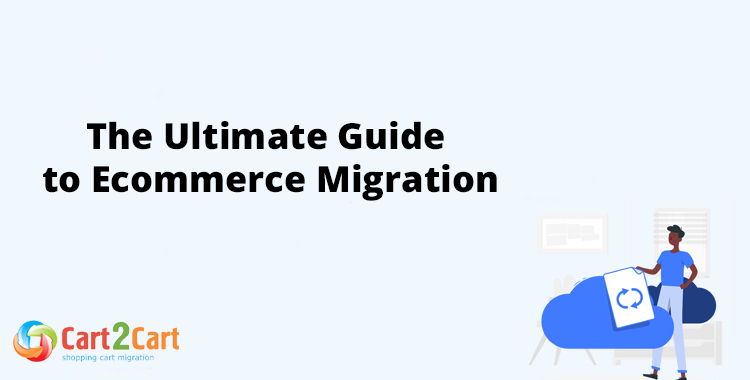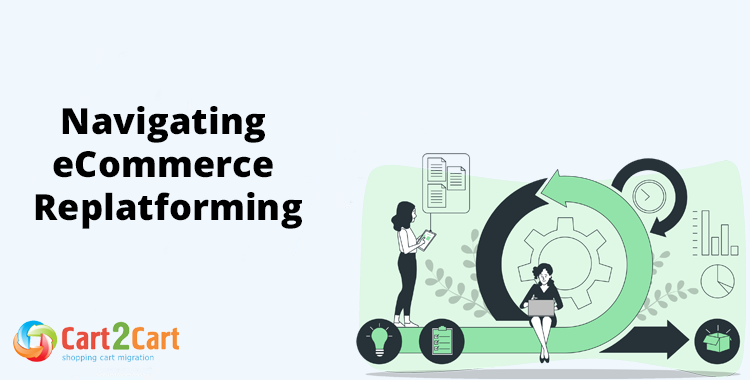Hybris Migration
Achieve a seamless Hybris Migration with Cart2Cart, the industry's most trusted and efficient solution. When you need to migrate from Hybris, our fully automated process guarantees a secure, zero-downtime transfer for your source store, typically completed in just a few hours. Eliminate concerns about complexity or data integrity; we expertly handle the comprehensive migration of your products, customers, orders, SEO URLs, and all critical store data. Confidently transition your eCommerce business with unparalleled speed and reliability.
How to Migrate to Hybris
This step-by-step guide details how to securely migrate to Hybris from any other e-commerce platform using Cart2Cart, ensuring complete data integrity for your online storefront.
- Register and Initiate: Create a Cart2Cart account to begin your platform switch. This initial step is free and takes only a minute.
- Connect Your Source Store: Provide the credentials for your current platform to allow secure API access for the data transfer.
- Connect Hybris Target Store: Install the Cart2Cart SAP Hybris Migration App on your store and provide the necessary API credentials to establish a secure connection.
- Select Data and Options: Choose which data entities to move, including products, SKUs, and customer orders. Configure crucial options like 301 redirects to preserve your SEO rankings.
- Run a Free Demo Migration: Launch a free test transfer to move a limited set of your data. This allows you to check the results directly in your new Hybris store before the full replatforming.
- Launch the Full Migration: Once satisfied with the demo, start the full migration. The process runs on our servers, ensuring no downtime for your business.
Pro-Tip: To connect your Hybris store, you must install the Cart2Cart SAP Hybris Migration App. Be aware that API rate limits may apply during the data transfer.
Automated migration
Just set up the migration and choose the entities to move – the service will do the rest.
Try It Free
Data Migration Service Package
Delegate the job to the highly-skilled migration experts and get the job done.
Choose Package
What data can be migrated from/to Hybris
-
Products
-
Product Categories
-
Manufacturers
-
Customers
-
Orders
Choose all the extra migration options and get 40% off their total Price
We’re committed to protecting our customers’ data security. Check out our Security Policy
The Cart2Cart service has all the necessary functionality to migrate store databases on Hybris of any size and complexity. Below are the most popular migration directions among our customers:
Help Center
Let’s figure out everything about Hybris migration through
Cart2Cart.
Discover our checklist, related articles, and answers on frequently asked questions.

 June 7, 2023
June 7, 2023 The Ultimate Guide to eCommerce Migration: How-To Directions and Best Practices
Read full articlePay only for what you migrate - the cost depends on the number of records to be moved
Get Your Instant Hybris Migration Cost Estimate
Use our tool to get an instant, transparent estimate of your Hybris migration cost, tailored precisely to your needs. This is a crucial step in planning your move, providing clear Hybris migration pricing with no hidden fees, so you understand your total Hybris migration price upfront.
Hybris Monthly Pulse: Navigating Enterprise Complexity with SAP Commerce Cloud
In a digital commerce landscape increasingly defined by consolidation and the demand for AI-driven efficiency, SAP Commerce Cloud, the successor to Hybris, continues to fortify its position as the bedrock for complex, large-scale enterprise operations. This month's analysis reveals a clear strategic focus: deepening integration within the SAP ecosystem, enhancing core platform resilience, and delivering intelligent features that address the nuanced challenges of global B2B and B2B2C leaders. The narrative is not one of disruptive pivots, but of deliberate, strategic reinforcement.
Enterprise Footprint and Competitive Posture
Recent market analysis, contextualized by SAP's latest quarterly earnings report, shows continued strength in its cloud services portfolio. While specific GMV figures for Commerce Cloud are integrated into the broader cloud unit, the platform's momentum is evident in its sustained leadership within the B2B Commerce and Digital Experience Platform quadrants of major analyst reports. This isn't about chasing market share in the SMB space; it's about dominating the high-complexity, high-revenue segment. SAP's strategy is to be the indispensable digital core for enterprises running SAP S/4HANA, positioning Commerce Cloud as the natural, deeply-integrated extension for their commercial operations and creating a powerful, defensible moat.
Core Infrastructure Resilience and Scalability
This month saw the completion of a significant infrastructure optimization initiative focused on data center efficiency and elastic scaling protocols. While not a headline-grabbing feature, this update is profoundly important for SAP's clientele. The engineering effort has resulted in a reported 15% improvement in resource provisioning times during peak load simulations. For a global manufacturer handling flash sales or a distributor managing complex, high-volume B2B ordering cycles, this translates directly into enhanced reliability, lower risk of revenue-damaging downtime, and a more predictable total cost of ownership (TCO) for their cloud environment.
Extensibility and the Composable Future
The developer ecosystem saw a notable expansion with the release of a new suite of headless APIs focused on complex order management and fulfillment. This move further solidifies SAP's commitment to a composable commerce strategy, allowing enterprises to use the robust backend of Commerce Cloud while building highly customized frontend experiences on the SAP Business Technology Platform (BTP) or other preferred frameworks. The key takeaway is that SAP is providing a pathway for clients to innovate at the "glass" without compromising the stability and power of their core commerce engine, a critical capability for brands seeking to differentiate on customer experience.
Strategic Innovation: AI-Powered Catalog Enrichment
The flagship feature release this period is the public beta of the "Generative Content Hub." This new tool, integrated directly into the product cockpit, leverages generative AI to assist merchandising teams. It can create sophisticated, SEO-optimized product descriptions, translate technical specifications into benefit-oriented marketing copy, and ensure brand voice consistency across thousands of SKUs. For B2B companies with vast and complex catalogs, this directly addresses a major operational bottleneck, dramatically reducing the time and cost required to bring new products to market while improving the quality of the end-user experience.
Fortifying the Digital Fortress: Advanced Data Residency Controls
In response to an increasingly complex global regulatory landscape, SAP has rolled out enhanced data residency and sovereignty controls for Commerce Cloud. Clients can now leverage more granular options for specifying the geographic location of their customer and transaction data, particularly for deployments within the European Union. This enhancement is not merely a compliance checkbox; it is a critical de-risking feature for multinational corporations navigating GDPR and other stringent data privacy laws, reinforcing the platform's reputation for enterprise-grade security and governance.
Expanding Global Reach: Unlocking the APAC Market
A new strategic partnership with a leading payment gateway consortium in Southeast Asia marks a significant step in simplifying cross-border commerce for SAP's clients. This pre-built integration, available on the SAP Store, removes a major layer of technical and financial complexity for businesses looking to expand into high-growth markets like Singapore, Malaysia, and Indonesia. This move demonstrates an astute understanding of global commerce friction points, providing a tangible accelerator for international expansion strategies.
Marquee Adoption: A Global Automotive Supplier Goes Live
Underscoring the platform's B2B dominance, a top-tier global automotive parts manufacturer recently launched its multi-brand, multi-country dealer portal on SAP Commerce Cloud. The decision was reportedly driven by the platform's native ability to handle incredibly complex product hierarchies, contract-based pricing, and its seamless, out-of-the-box integration with their existing SAP S/4HANA ERP for real-time inventory and order data. This migration is a testament to SAP's core value proposition: providing a unified, scalable, and reliable commerce solution for enterprises whose business logic is simply too complex for other platforms to handle effectively.
Source: This analysis is synthesized from public announcements on the official SAP News Center, developer portal release notes, third-party e-commerce industry reporting, and market analysis from leading technology research firms.
Just set up the migration and choose the entities to move – the service will do the rest.
Try It FreeDelegate the job to the highly-skilled migration experts and get the job done.
Choose Package















